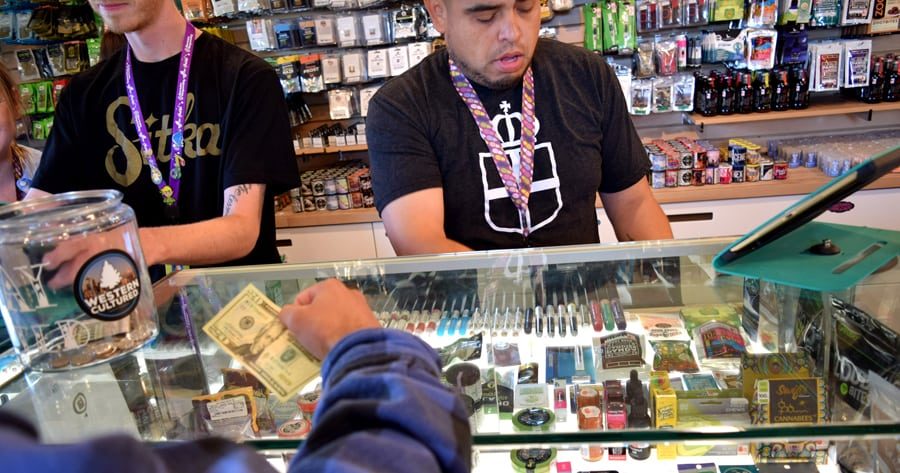
Home » Marijuana sales budding in Benton County, statewide
Marijuana sales budding in Benton County, statewide

June 15, 2017
By Michelle Dupler
Benton County and Washington state marijuana retail sales bloomed in fiscal year 2016, and the high appears to have continued into 2017, according to data from the Washington State Liquor and Cannabis Board.
[blockquote quote="We’re your grandma’s cannabis store." source="Steve Lee, owner of Green2Go" align="right" max_width="300px"]
Retail sales in Benton County were up by 75 percent in the 2016 fiscal year compared to the 2015 fiscal year, from about $2.8 million to more than $4.9 million.
Statewide, retail sales grew by 180 percent from the 2015 fiscal year to the 2016 fiscal year, from $179.6 million to $501.9 million.
The state’s fiscal year begins on July 1 and runs through June 30.
When sales related to marijuana producers and processors are factored in, the statewide growth is even more dramatic, approximately tripling from $259.5 million to $786.4 million.
So far in 2017, the state’s total marijuana sales including retail, production and processing is a more than $1.2 billion industry, according to state data. That represents growth of more than 52 percent compared to the 2016 fiscal year.
Specific information for Benton County 2017 sales was not available through the state’s data sets. However, local business owner Steve Lee of Green2Go in unincorporated Kennewick said he foresees continued steady growth as the state’s industry matures.
“In my opinion, the reason the marketplace is moving forward is that farms and stores are doing their jobs better and better,” he said.
Washington voters opted to legalize the recreational use of marijuana by passing Initiative 502 in 2012. Along with Colorado, it was one of the first states in the nation to legalize use of what remains an illegal controlled substance under federal and many other states’ laws.
Prior to I-502, Washington had allowed for the use of medical marijuana by authorized patients with certain qualifying conditions dating back to the passage of Initiative 692 in 1998.
Lee and his wife, Jessy, opened Green2Go in 2012 to dispense medical marijuana and expanded into retail sales after I-502 passed and the state implemented a regulatory and licensing framework.
He said since recreational sales began, a combination of factors have resulted in a more efficient industry and that, in turn, helps boost sales and revenues.
Aaron Pickus, spokesman for the Washington CannaBusiness Association, a trade organization that represents the interests of marijuana-related businesses, said that while cannabis production, processing and retail is still a new industry in Washington, businesses are becoming more savvy, especially in an environment in which the state is constantly refining laws and regulations.
“There’s a lot still that’s being put into place to make sure the marketplace is accessible,” Pickus said. “It makes it different than a more established industry. It’s growing very fast, but I don’t think anyone should take that success for granted.”
He noted that it’s important for everyone in the industry to continue to provide a safe and controlled product for consumers, which was voters’ intention in passing I-502.
Pickus said although a lot of the retail activity is in places like Seattle and Spokane because many municipalities across the state opted for bans on marijuana sales, he’s seeing more producers and processors open facilities in Eastern Washington.
In the Tri-City region, Richland, Kennewick, Pasco and Franklin County all opted for bans on retail sales. Only Benton County chose to permit recreational marijuana sales. According to the Liquor and Cannabis Board, there are currently four licensed retail shops in the county — Lee’s shop just outside of Kennewick, and three in the Prosser area. But one shop in Prosser has reported no sales.
Pickus said that another potential factor driving sales may be marijuana tourism — people opting to vacation in Washington because they know they can legally partake while they’re in the state.
“We’re definitely seeing business in the tourism industry,” he said. “It is attracting visitors to our state.”
Pickus said there are some local efforts underway to promote ways for out-of-state visitors to safely use marijuana products, such as “consumption lounges” where they could go to use products on the premises. However, that would take legislative approval and the bill wasn’t approved in the 2017 session.
Lee said with his Tokio location in proximity to Interstate 395, he often gets customers from Idaho, Oregon, or even Utah who make it a point to stop at Green2Go when they’re road-tripping through Washington or are on their way to a concert at the Gorge. He’s even had some who made it a 21st birthday destination.
“It does drive much more than regional traffic,” Lee said.
However, the shop doesn’t advertise or solicit business from out-of-state customers since Washington law doesn’t allow that, he added.
Lee said customers at his Tri-City shop, and a second shop in Tokio near Ritzville, continue to be a mix of medical users who want to alleviate pain or symptoms related to chronic or terminal illness, and recreational users who just want to enjoy themselves.
Jessy Lee said that one factor driving sales is people trying to break addictions from opioids or other substances, even alcohol.
“I do think we’re seeing an increase in people trying to get off of prescription painkillers,” she said.
Steve Lee said another factor may be slowly shifting attitudes toward marijuana use. As retail stores make access feel more safe and comfortable to a wider demographic of people, more people may be willing to try either medical or recreational marijuana.
He said that he and his wife base their business model on being clean, well-lit and a place that someone’s mother or grandmother would feel safe walking into.
“We’re your grandma’s cannabis store,” he said.
Local News Agriculture
KEYWORDS june 2017




